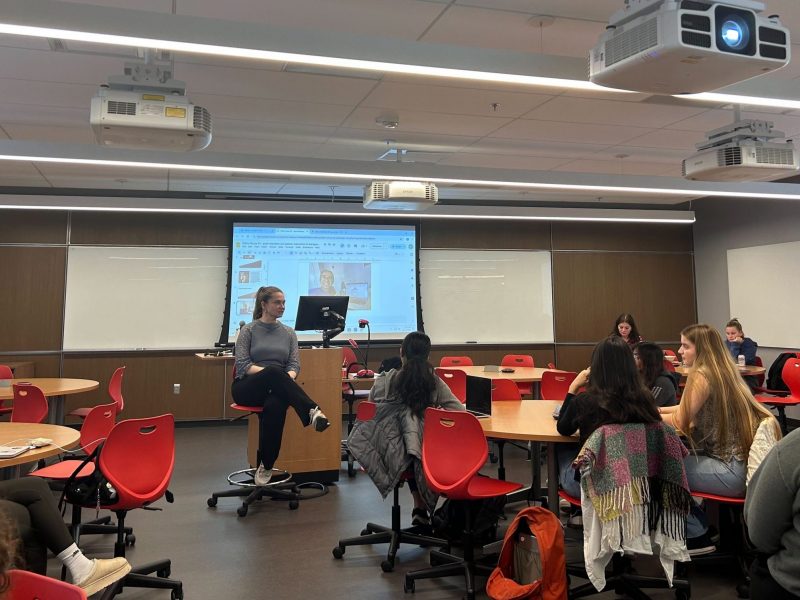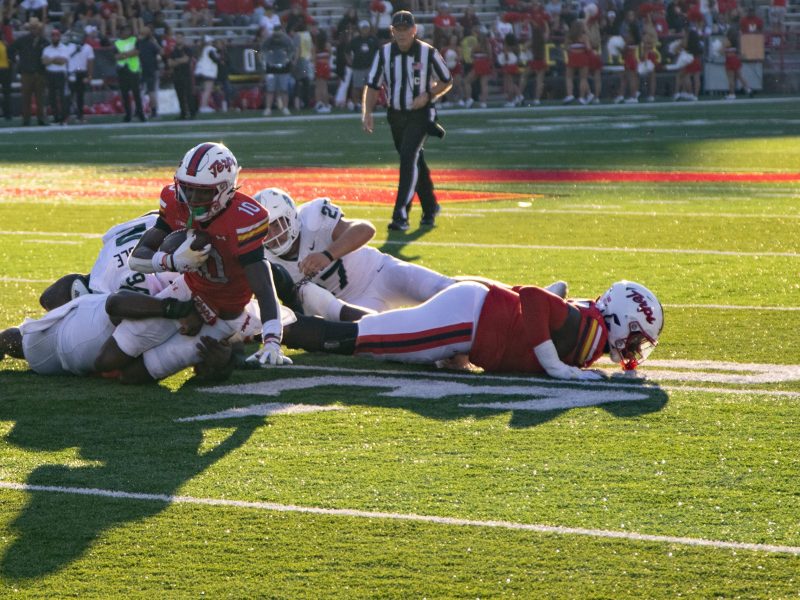
Moderator Shibley Telhami (left) discusses questions of America’s relationship with the Middle East with William J. Burns at the Sadat Forum for Peace in the Stamp Student Union Grand Ballroom on Tuesday, Oct 6.
Amidst a Syrian refugee crisis in Europe and an Iranian nuclear deal, William Burns looked back on years of fragility and instability of the Middle East and the United States’ relationship during his visit to this university.
“After 9/11, we were determined to root out threats … and we took the lid off a complicated society,” Burns said. “We fell into a habit of thinking that military should be our number one response.”
In front of an audience of about 280 people Tuesday afternoon, Burns, the president of the Carnegie Endowment for International Peace, spoke about issues plaguing the Middle East for about an hour and a half in Stamp Student Union’s Grand Ballroom.
Burns, an expert in Middle Eastern diplomacy who has had a 33-year diplomatic career and was the U.S. deputy secretary of state, fielded questions from Shibley Telhami, this university’s Anwar Sadat Professor for Peace and Development, who moderated the discussion. Telhami, a longtime friend of Burns’, discussed topics such as past conflicts, the war in Iraq, ISIS and the refugee crisis.
President Barack Obama and his diplomatic team met with Iran officials for 10 months before going into public talks about a nuclear deal, Burns said.
“At first, Obama was focused on getting leverage, testing Iranian intentions and investing in international support of the plan,” Burns said.
Permanent members of the United Nations Security Council unanimously signed a nuclear deal in July; Congress tried and failed to block the deal last month. “It doesn’t solve all problems or threats … but it was the best available alternative,” Burns said.
Refugees moving into other countries from Syria has proved another controversial issue for the United States to tackle, Burns said.
“U.S. leadership is important in terms of taking in refugees,” Burns said. “If you want to get others to do more, either by shaming or encouraging, we need to do it first.”
Burns also analyzed the United States’ past history with the Middle East and how that has contributed to building conflict. ISIS, Burns said, might have been the product of conflict in Iraq and Syria.
Telhami asserted that the war in Iraq was “the most disastrous event in U.S. foreign policy,” and Burns echoed his sentiment that the war was costly — in terms of lives and expense.
“You can’t trace every fragility in the Middle East back to that, though,” Burns said.
While U.S. government officials have made an honest attempt at fixing relations in the Middle East after 9/11, Burns said, American foreign policy has gone in a bad direction, especially in overbearing behavior toward foreign leaders and an overreliance on military power.
When former Egyptian President Hosni Mubarak was overthrown, it came as a surprise, Burns said. He added that he doesn’t usually agree with the extent to which the United States asserts itself in other countries, but he approved of Obama’s actions.
“I’m not a big fan of the U.S. pronouncing itself on world leaders,” Burns said, “but no matter what, there is risk in action and inaction.”
Freshman Muneebah Quereshi attended the lecture Tuesday. She said she enjoyed it, but she wished there would be more time for questions.
“I thought it was pretty good, although it wasn’t as much about where the United States is going from here,” said Quereshi, a mathematics major.
Doctoral student Carla Abdo said both Burns and Telhami were well-versed speakers — Telhami crafted provoking questions, and Burns answered them well.
“There are 22 countries in the Middle East,” Abdo said. “There’s so much more you could do. In the space of an hour and a half, though, [the lecture] was very sophisticated.”
Looking forward, Burns said the next president will not be able to ignore problems in the Middle East, and will have to focus on rebalancing the United States’ priorities.
“The Middle East still matters,” Burns said. “As Americans, we can’t afford to neglect it.”


